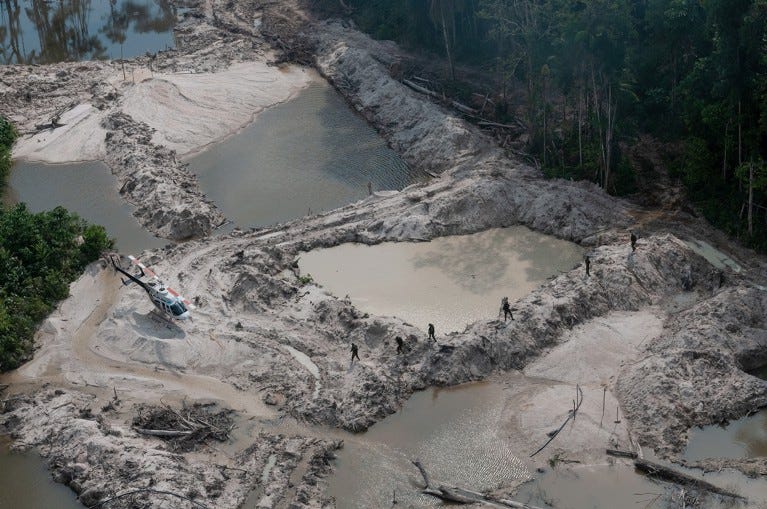thehealthtransformation
.foundation
Joaquim Cardoso MSc
February 1, 2024
This is a republication of the paper “Brazil’s deforestation ‘police’ on strike — threatening climate goals”, preceded by Key Insights by the Editor of the Portal.
Key takeaways from the situation in Brazil regarding the strike of environmental workers and its potential impact on climate goals:
- As a presidential candidate in 2022, Lula promised to reach zero deforestation in all Brazilian biomes by 2030.
- For the past month, workers in the Brazilian government’s environmental agencies have been partially on strike
Deforestation Surveillance at Risk:
Environmental workers in Brazil, responsible for field operations such as deforestation surveillance and shutting down illegal mining operations, are on strike due to demands for better pay and resources. This strike could halt critical operations aimed at curbing deforestation.
Demand for Better Working Conditions:
Workers have been demanding more resources and better pay, citing inadequate compensation and overwork. Despite promises by President Luiz Inácio Lula da Silva, there has been no significant improvement in their working conditions.
Potential Environmental Impact:
The strike jeopardizes Brazil’s efforts to meet its climate goals, particularly the pledge to achieve zero deforestation by 2030. Strengthened inspections in the Amazon have contributed to a reduction in deforestation rates, but the strike threatens to reverse this progress.
Safety Concerns:
Environmental workers face risks to their safety in the field, including encounters with organized crime groups involved in illegal activities such as gold mining and land grabbing.
Support from Researchers:
Brazilian researchers support the strike, emphasizing the importance of investing in environmental workers who play a crucial role in frontline conservation efforts.
Impact on Enforcement:
With the majority of environmental specialists participating in the strike, fieldwork, inspections, and licensing activities have been significantly disrupted. This has led to a drastic reduction in environmental fines issued, particularly in the Amazon region.
Political Context:
The strike occurring during Lula’s tenure is notable, given the challenges faced by environmental workers under the previous administration of Jair Bolsonaro. While there has been public support under Lula’s administration, structural changes to address worker demands have not materialized.
Importance of Negotiations:
There is hope that ongoing negotiations between the government and the environmental workers’ union will lead to a resolution. Researchers emphasize the critical role of surveillance and inspection in combating illegal deforestation, highlighting the urgency of resolving the strike to avoid further environmental damage.
DEEP DIVE

Brazil’s deforestation ‘police’ on strike — threatening climate goals
Environmental workers in the government have stopped field operations, and might halt work altogether.
Nature
Meghie Rodrigues
31 January 2024
For the past month, workers in the Brazilian government’s environmental agencies have been partially on strike: they have stopped working in the field, where they conduct deforestation surveillance and help to shut down illegal mining operations. But, if their demands aren’t met, they could soon turn up the heat on the government and stop working altogether — which could halt research that helps with environmental policymaking.
Members at the Brazilian Institute of Environment and Renewable Natural Resources (IBAMA), the country’s environmental protection agency; the Chico Mendes Institute for Biodiversity Conservation (ICMBio), which manages the country’s protected areas; and the Brazilian Forest Service (BFS) have since 2017 been asking for more resources and better pay.
The administration of Brazil’s current president, Luiz Inácio Lula da Silva, last year issued a 9% raise to all civil servants after he took office. But environmental workers hadn’t received a raise in the past seven years, and the pay bump isn’t enough to counter inflation, they say. Their union, the Brazilian National Association of Environmental Careers (Ascema Nacional), points out that, from 2003 to 2023, about 720 environmental workers were dismissed to fill other government roles — meaning that the ones who remain are overworked.
As a presidential candidate in 2022, Lula promised to reach zero deforestation in all Brazilian biomes by 2030. To reduce deforestation, environmental agencies have had to strengthen inspections in the Amazon rainforest and elsewhere. Their efforts so far seem to have helped: deforestation rates in the Amazon, which is crucial to curbing climate change because it absorbs huge amounts of carbon dioxide, fell to a five-year low in 2023.
Not only are they overworked, the employees say, but their safety is also at risk. In the field, they have to grapple with people connected to organized crime, such as illegal gold miners and land grabbers.

“
Because of the low pay, we have been losing personnel to more attractive careers, even within the public service,” says Alexandre Gontijo, a member of Ascema Nacional’s board of directors and an environmental specialist at the BFS. “Our responsibilities increase while the number of servants decreases, and things get more difficult as work piles up. Surveilling the Amazon, for example, is not a trivial task.”
Ascema Nacional will meet with representatives from Brazil’s Ministry of Environment and Climate Change and its Ministry of Management and Innovation in Public Services on 1 February to discuss the demands and whether workers will additionally halt administrative work.
Although they worry about the consequences, Brazilian researchers support the movement and are calling on the Lula administration to invest in its workers. “If the environment is at the heart of Brazil’s foreign policy, supporting workers in the area should be a key domestic policy,” says Erika Berenguer, an Amazon-fire researcher at the University of Oxford, UK. “It’s essential to value those who put their own bodies at the front line.”
In a statement to Nature, the Brazilian management ministry says that it has held 21 round-table discussions in the past year to negotiate with federal workers across many departments. It also said that it is working within budgetary limits to meet the demands.
Feeling the impacts
IBAMA staff members went on strike on 2 January, and workers at other environmental agencies followed suit a few days later. Their aim was to bring the government back to the negotiating table. Last October, Ascema Nacional met with the management ministry, but no resolution was reached. “The government promised to give us an answer in 30 to 45 days, but we got none,” says Cleberson Zavaski, president of the union and an environmental specialist at ICMBio.
At the moment, Zavaski says, the only fieldwork underway is that under judicial order, and that to address emergencies or hazards, such as large forest fires. “Environmental inspection and licensing, forest-fire prevention and field research with poisonous animals, for example, are frozen. Only office work is fully operational,” he adds.
About 90% of all federal environment specialists are participating in the partial strike, Zavaski says. According to Brazil’s Personnel Statistics Panel and Ascema Nacional, there are about 4,800 active environmental workers at Brazil’s federal agencies.
Following the strike, only 16 environmental inspectors remain in the field in Brazil, two of whom are in the Amazon, according to the union. And the impacts are starting to be felt: inspectors issued 93% fewer environmental fines in the Amazon during the first two weeks of January than in the same period last year.
Structural change
That the strike has happened during Lula’s tenure is surprising to some. Under his predecessor — Jair Bolsonaro, an industry-friendly leader — deforestation in the Amazon hit a 15-year high, and more than 180,000 environmental fines, worth 1.3 billion reais (US$260 million), were overturned. “Loss of resources and public attacks made our work very difficult [under Bolsonaro], but we made an effort of resilience to keep working,” Gontijo says. “Then Lula came in, and although we’ve had public institutional support and an end to the attacks, we did not have structural change.”
In a public statement earlier this month, the environment ministry, which is home to the agencies on strike, said that, after negotiations last year, it sent a request to the management ministry to hold public calls to fill some 3,300 staff vacancies at IBAMA, ICMBio and the Botanical Garden of Rio de Janeiro.
Researchers are keen for the negotiations to bear fruit this week. Celso Silva Jr, a remote-sensing and land-use researcher at the Amazon Institute for Environmental Research in Brasília, says that surveillance and inspection are key to suppressing illegal deforestation in the Amazon. The strike raises concern “because reversing the current downward trend [in deforestation] would result in further loss of biodiversity and carbon emissions into the atmosphere”.
doi: https://doi.org/10.1038/d41586-024-00279-2
Originally published at https://www.nature.com on January 31, 2024.












